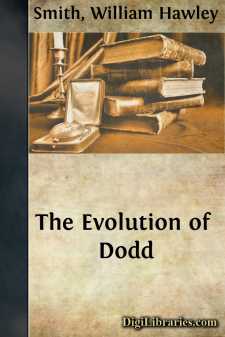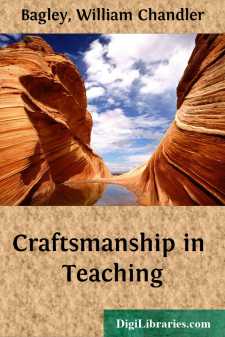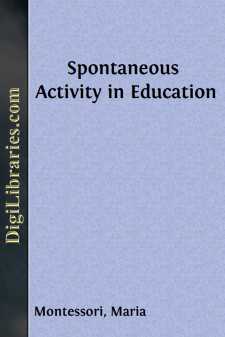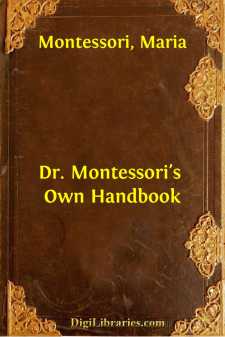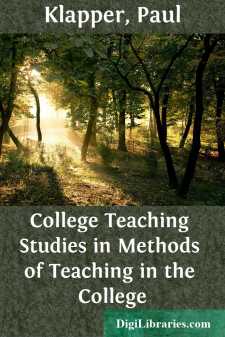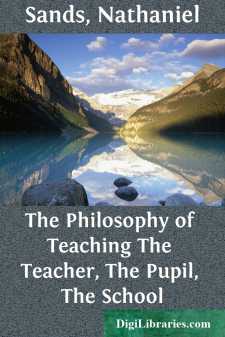Education
- General 32
- Preschool & Kindergarten 1
- Study Skills 3
- Teaching Methods & Materials
Teaching Methods & Materials Books
Sort by:
CHAPTER I. There was joy in the Weaver household when the child was born, and when it had been duly announced that it was a boy. The event was the first of the kind in this particular branch of the Weaver family, and, as is always the case, there was such rejoicing as does not come with the recurrence of like episodes. A man hardly feels sure of his manhood till the magic word father is put in the...
more...
CHAPTER I TEACHING SCHOOL Life and living compared.—There is a wide difference between school-teaching and teaching school. The question “Is she a school-teacher?” means one thing; but the question “Can she teach school?” means quite another. School-teaching may be living; but teaching school is life. And any one who has a definition of life can readily find a definition for teaching...
more...
A Preliminary Survey of the Task Before the School When people come to think alike, they tend to act alike; unison in thinking begets unison in action. It is often said that the man and wife who have spent years together have grown to resemble each other; but the resemblance is probably in actions rather than in looks; the fact is that they have had common goals of thinking throughout the many years...
more...
CHAPTER I Craftsmanship in Teaching I "In the laboratory of life, each newcomer repeats the old experiments, and laughs and weeps for himself. We will be explorers, though all the highways have their guideposts and every bypath is mapped. Helen of Troy will not deter us, nor the wounds of Cæsar frighten, nor the voice of the king crying 'Vanity!' from his throne dismay. What wonder that...
more...
by:
Maria Montessori
A SURVEY OF THE CHILD'S LIFE The general laws which govern the child's psychical health have their parallel in those of its physical health.—Many persons who have asked me to continue my methods of education for very young children on lines that would make them suitable for those over seven years of age, have expressed a doubt whether this would be possible. The difficulties they put...
more...
by:
Jacob Abbott
CHAPTER I.INTEREST IN TEACHING. There is a most singular contrariety of opinion prevailing in the community, in regard to the pleasantness of the business of teaching. Some teachers go to their daily task, merely upon compulsion: they regard it as intolerable drudgery. Others love the work: they hover around the school-room as long as they can, and never cease to think, and seldom to talk, of their...
more...
I THE PURPOSES OF THE RECITATION The teacher has two great functions in the school; one is that of organizing and managing, the other, that of teaching. In the first capacity he forms the school into its proper divisions or classes, arranges the programme of daily recitations and other exercises, provides for calling and dismissing classes, passing into and out of the room, etc., and controls the...
more...
by:
Maria Montessori
DR. MONTESSORI’S OWN HANDBOOK Recent years have seen a remarkable improvement in the conditions of child life. In all civilized countries, but especially in England, statistics show a decrease in infant mortality. Related to this decrease in mortality a corresponding improvement is to be seen in the physical development of children; they are physically finer and more vigorous. It has been the...
more...
by:
Paul Klapper
PREFACE The student of general problems of education or of elementary education finds an extensive literature of varying worth. In the last decade our secondary schools have undergone radical reorganization and have assumed new functions. A rich literature on every phase of the high school is rapidly developing to keep pace with the needs and the progress of secondary education. The literature on...
more...
by:
Nathaniel Sands
TEACHER AND PUPIL. Of the various callings to which the division of labor has caused man specially to devote himself, there is none to be compared for nobility or usefulness with that of the true teacher. Yet neither teachers nor people at present realize this truth. Among the very few lessons of value which might be derived from so-called “classical” studies, is that of the proper estimate in...
more...


